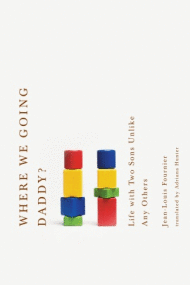
Other Press, 2010
What are the parents of handicapped children allowed to say about their experience? That it is hard, of course, that they are sad, yes. But how about a father admitting that he feels like closing his eyes and pressing a little harder on the gas pedal when driving the kids home from school?
This avowal is just one of many alarmingly-honest statements in Jean-Louis Fournier’s memoir, Where We Going, Daddy, published in 2010 by Other Press in an excellent translation by Adriana Hunter. Fournier, a celebrated French comedian, writes about what happened to his life after having not just one, but two, severely physically and mentally handicapped children.
Where We Going, Daddy is not a memoir in the traditional sense. This is not Fournier’s attempt to work his way to some form of catharsis through well-structured essays, poetic descriptions of his suffering and a philosophical attitude toward Thomas and Mathieu’s handicap. This slim book, written in part as a letter to his sons and in part a collection of vignettes of remembered moments, is appropriately stark. Straightforward sentences, frank descriptions and anecdotes presented without any graceful literary mediation. Only occasionally does Fournier soften his prose, revealing a glimpse of the sorrow residing beneath his sharp-tongued rage:
When they’ve got their braces on they look like Roman warriors in breastplates, or characters from a science fiction cartoon because of the gleaming chrome.
When you pick them up in your arms it feels like you’re holding a robot. A metal doll.
It takes a monkey wrench to get them undressed at night. When you peel their breastplates off, you find purple welts left on their naked torsos by the metal stays, and all that’s left are two shivering little plucked birds.
This type of writing is rare, creating a series of lyrical and emotional explosions outward from the even surface of Fournier’s otherwise steadfastly and darkly comic writing. His comedy is a bleakly honest kind of humor. Disconcerting, but never false. In one vignette, he relates how he came home one day to find the nanny in Thomas and Mathieu’s room. She is alone, standing next to an open window. He jokes, “Why’ve you thrown the boys out the window? I know they’re handicapped, but that’s no excuse to throw them out.” The woman is appropriately shocked. Even frightened of him. She cannot accept his need to dispel the awful thought with such a joke. Or later, aware that he’s in bad taste but unable to stop himself, he asks the head consultant of the special school Thomas and Mathieu attend, in a painfully ironic attempt to mimic the concerns of the parent of a normal child, whether his children might be completely normal, whether they should indeed be enrolled.
But more often his comedy turns inward, into a kind of stunned and horrible mocking at what has happened and the choices he must consider. At one point, his grandmother, with kind intentions, urges him to take the boys to Lourdes, to pray for a miracle. He imagines the trip:
And when we get there, with the crowds, the processions, the darkness, I could lose them and never find them again. Could that be the miracle, then?
Fournier’s brutal honesty does not make for comfortable reading. And Where We Going, Daddy, which won France’s prestigious Prix Femina in 2008, is the subject of some controversy. Fournier is not interested in describing his children as damaged but happy creatures, nor does he make any attempt to resolve the guilt and anger he feels when he finds the courage to reflect upon his life with them.
Where We Going, Daddy isn’t just a consideration of Fournier’s misfortune, however. Much of his anger comes from an empathetic reading of his sons’ lives. He refuses to accept that Thomas and Mathieu wouldn’t have preferred a normal life if given the choice. And then he twists that hopeless thought, making its impossibility a little easier to swallow:
But if you’d been like other people, you would have been like everyone else. Maybe you wouldn’t have achieved anything in school. You’d have been a couple of delinquents. You’d have taken the mufflers off your scooters to make more noise. You’d have been unemployed. You’d have liked Jean-Michel Jarre. You’d have married dumb broads. You’d have gotten divorced. And maybe you’d have had handicapped children.
What a narrow escape!
Fournier’s vision is jarring, sometimes even unforgivable. His world is constructed out of the sad cement of grief and anger. The only way to push back his angry sky or knock down the walls of his house of grief is to find a way to laugh. Laughter, no matter how dark or angry, becomes a suit of armor broad enough to protect not only Fournier, but also his sons. And in this way, his book, an object forged within the heat of that wide-mouthed mocking fury, becomes a compassionate shelter for Thomas and Mathieu.